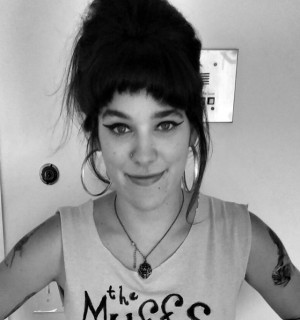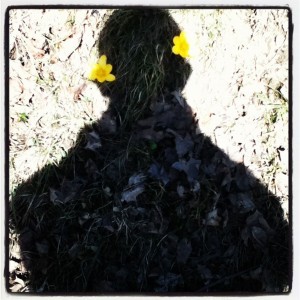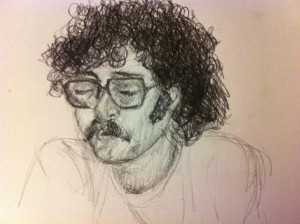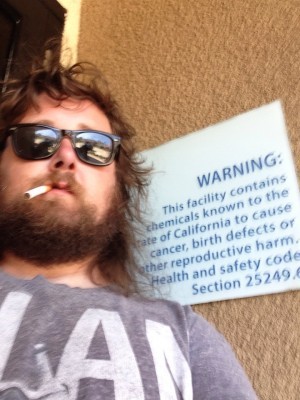Rusty Barnes's Blog: Fried Chicken and Coffee, page 15
October 15, 2015
Three Poems, by Mary Benson
The Fear of Losing a Crummy Waitressing Job
In a dream I’m lifting bus buckets,
arms brimming liquid sludge
while the credit machine shuts down
and the party of seventeen walks out
without tipping, and I don’t wake
until the fourth alarm.
I’m still in my underwear,
dressed in my finest hangover
after last night’s post-shift, shooting
shit with the cooks who all have girlfriends
that secretly despise me
for hanging around so late, and I search
for a pair of black pants in a pile
of black shirts caked
in day old mustard, search
for lipstick in yesterday’s pockets
when I know all customers
are unimpressible,
and the job is tedium.
I’m clawing through apron piles
of rolled dollar bills for my eyeliner
because really there is no light
in the job other than that glance you get
from behind a kitchen window
from a cook you’ve already slept with
on a drunken occasion, or a wife
watching her husband while he watches you
walk away, your back pockets stained
with mysterious condiments.
There really is no other point
in rushing there.
The Dunkin Donuts behind my Apartment Building
has my black iced dark roast ready
before I fully enter the door.
The cashier with acne scars
who always looks on edge quivers
his wrists and says “how’s it going”
and I say “not bad,” and it goes
nowhere from there
because that’s conditioning: nobody
is conditioned to speak at Dunkin Donuts,
nobody is expected to know names.
That’s a local coffee-shop thing where they ask
about your kids if you have them
or your job if you’ve ever mentioned it.
I don’t have kids
and don’t particularly love waiting
tables, especially today when I’m hung
–over with contact lenses still glued
in place and a cigarette waiting to be lit
but the small Puerto Rican girl with the beautiful
freckles doesn’t ask questions
and today the manager with the graying orange
hair and blue eye-shadow is yelling
at a new girl for ringing in two coffees instead of one,
and I wish it wasn’t so entertaining
to watch the heat rise
to the girl’s cheeks
while the manager’s eyes bulge
in that way that says “I’m in control now”
because I’ve been there before
in so many jobs
where I hated heavy female
managers because they were always
the most volatile towards girls
who wore eyeliner and small jeans,
but there was a comfort
in the top-20 playlist
on loop, and the anonymity of ticket
numbers, and that one spot to fixate
on in the distance beyond
the coiled line of construction workers
and antsy children, especially on mornings
like today where there’s a fight
between two teenage girls in the parking lot,
and a Coolata just flew from
a parked car window.
Servers walking Home at Night
To the cat-calls erupting
from the slowed SUV,
we deal with slobs all night
and know how to walk away
from a shattered pint-glass,
a baby’s persistent howl,
a man who wants something
we don’t sell. We carry keys
bunched like knives,
Travel-sized hairspray cans.
Desperate weapons, but we make a living
darting between trashcans.
We make a killing
on our feet. We clock in
knowing certain things will happen,
like large parties
who don’t tip. Five babies
in one booth. So to the bodies
swaying in the gas station
glow, we’ve clocked out.
To the crowd emptying
from the strip of bars,
we reek corn oil
and drugstore makeup.
Let us have this one.
 Mary Benson currently lives in Somerville, MA. She earned her MFA in Creative Writing from Lesley University with a focus in poetry in 2013. Her writing often stems from experiences in various service industry jobs, a working class upbringing in rural New Hampshire, and strange fragments of childhood memory.
Mary Benson currently lives in Somerville, MA. She earned her MFA in Creative Writing from Lesley University with a focus in poetry in 2013. Her writing often stems from experiences in various service industry jobs, a working class upbringing in rural New Hampshire, and strange fragments of childhood memory.
October 13, 2015
Five Poems by Randi Ward
Gate
Oh merciful
gate, break
these legs
for me
so I don’t
have to
walk home.
Procession
Blowing
through red
lights on
our way
to the graveyard—
death
stops for no one.
Daisy
Pluck a ray
from the eye
of day; each petal
is a flower—
tossed
away.
Old Timer
Whittling corn
flowers from water
maple twigs
in samara rain.
Widow
Wandering
fence lines
limp
as a morning
glory’s spent
petals.
 Randi Ward is a writer, translator, lyricist, and photographer from West Virginia. She earned her MA in Cultural Studies from the University of the Faroe Islands and is a recipient of the American-Scandinavian Foundation's Nadia Christensen Prize. Ward is a Pushcart Prize and Best of the Net nominee whose work has appeared in the Anthology of Appalachian Writers, Asymptote, Beloit Poetry Journal, Cimarron Review, The Cortland Review, Thrush Poetry Journal, Vencil: Anthology of Contemporary Faroese Literature, World Literature Today, and other publications. For more information, visit: www.randiward.com/about
Randi Ward is a writer, translator, lyricist, and photographer from West Virginia. She earned her MA in Cultural Studies from the University of the Faroe Islands and is a recipient of the American-Scandinavian Foundation's Nadia Christensen Prize. Ward is a Pushcart Prize and Best of the Net nominee whose work has appeared in the Anthology of Appalachian Writers, Asymptote, Beloit Poetry Journal, Cimarron Review, The Cortland Review, Thrush Poetry Journal, Vencil: Anthology of Contemporary Faroese Literature, World Literature Today, and other publications. For more information, visit: www.randiward.com/about
October 11, 2015
Tramp On Your Street, essay by the Legendary Jim Parks
Six Shooter Junction – He had a spirit bag masquerading as one of those filmy little white plastic numbers they give you at Wal-Mart to carry small purchases.
As the days of the trial wore on, he put his hand inside it and rubbed certain objects – a feather from a raptor's wing, a piece of jade or agate picked up on a mountain slope, a claw of some woodland creature – and if you looked closely, you could see that his eyes were neither open, nor closed. He was in a rapture, a near-trance, deep in meditation.
One afternoon, while a witness droned on and the attorneys leapt like overheated hounds at points of procedural and evidentiary arcana passing in the breeze of the still and rank dragon's breath of the courtroom, I joined him there for a few moments and saw a steep gorge and a narrow, precarious path that skirted the chasm in which I was definitely following in someone's footsteps – and then the moment passed, and when I looked up, Billy Joe Shaver, seated at his place inside the bar, at the defense table, was staring me in the eye.
He was there to answer for his part in the kind of hassle from which only an outlaw troubadour, a wordsmith capable of writing about how a cowboy “filled up his boots with his feet,” or that when Hank sang, he sang every word, “looking right straight at me,” could emerge with any degree of aplomb, much less maintain the cool and calm demeanor of a honky tonk hero.
He was indicted for assault with a deadly weapon against a man who brandished a switchblade, stirred people's drinks with its keenly whetted blade, and insulted his wife's honor by suggesting in loud tones and a rude manner that on a day long before, she was the cause of a former husband's suicide by shooting himself in the head while she was in the next room. This scene had become a routine irritation, whenever the couple appeared together in public in and around Waco or its southern suburbs. The old boy who shot himself had a large family.
The truth emerged, little by little, that the defendant, who was of an age that if convicted and sentenced to serve a lengthy prison term, would probably spend his last days behind bars, was actually acting in self defense, as his attorney Dick DeGuerin had told the jurors in his opening statement. There was no dispute that while he and his wife Wanda had been out drinking a beer at a neighborhood bar on open mike night, Billy Joe shot their interlocutor in the mouth with a tiny .22 revolver, a derringer you could conceal in the palm of your hand.
It was the source of the difficulty, not the little revolver, but what was coming out of the man's mouth; that was not its only ramification, as it turned out.
Quite simply, once the deed was done, Shaver collected his wife, got in his car, and split, headed for Austin. He didn't see any need to stick around, and he had his reasons. Jurors acquitted him of the charge. He later plead guilty to possession of a firearm in a place where alcoholic beverages are sold and consumed, a minor crime that is hardly of the magnitude of a first class felony.
After a considerable length of time – way more than a year — I got one of those once-in-a-lifetime interviews scribblers rarely see, the one where the person the scribbler intended to interview actually interviews the scribbler. It was as if on an ordinary journey, bearing the wood, bearing the water, I crossed paths with the Bodhisattva, who awaited me at an obscure turn on that precipitous path I had started down so many moons in the past. Howdy, there.
In the hardware section of a local lumber yard, I shopped for a work light to use in shooting video, and, absorbed with the task, looked up once again to confront Billy Joe Shaver lamping me down the length of a considerable beak, the kind that labels a man as a breed. His father was a Black Foot.
This time, he was smiling, where before on that day in the court, he was frankly staring at an intruder in his world.
On the time line of the legendary, there are infrequent and obscure deadlines, syncopating punctuations that are hard to discern – abbreviated moments in time, for which one waits.
“I just now remember who you are,” he said, as if resuming a conversation interrupted only a few moments before. “You're that old boy from down at Houston, always doing things with words, aren't you?”
Yes, that's me. I reminded him we met during an obscure year at an old and long-forgotten bar downtown in the Bayou City, not far from the courthouse square, where songwriters showcased their wares several decades in the past. We talked about how Elvis during a performance made everyone feel like he was looking at them, and so did Hank Williams. Many people who caught their act have said so.
“I have something I want you to know about what happened,” Shaver said. “That night I shot that old boy, I didn't say, 'Where do you want it?'”
He paused, let that sink in. His antagonist had invited him to see him out back, and Shaver made a bee line for the door after first going to his car to leave, then changing his mind. He wanted to let his eyes adjust to the darkened porch and picnic area after the neon and stage lights of the bar. It was a show down, and not one he necessarily provoked. Watch this.
In a verse of a song he inscribed, “Wacko From Waco,” he said, “I don't start fights; I finish fights, and that's the way it's always been.” Had I heard it? I pronounced the new song smoking.
And, then, out of the blue, apropos nothing, he said it was not until his challenger drew a pistol and aimed it that he defended himself with his firearm. Blow me down.
“And yet, that was nowhere mentioned in the officers' testimony or any of the witnesses',” I replied. “Why didn't you tell them?”
“They didn't ask,” Shaver replied. The statement hung in the air like Spanish moss in a mighty oak, the kind germinated prior to the coronation of Elizabeth I. He looked as deadly serious as any serious man to whom I have ever spoken about any serious matter. I never asked him. At least, not with words. He told me.
I've kept that rock in my hand – until now – because I knew there would be a better time to play it, a time when it would count. There is a reason for that. It's a lesson taught by one old boy who does things with words to another old boy – one who does things with words. I am truly grateful. Somebody tell those folks in Austin. Remind them, too. They seem to be in a mood to call the question, the one about “wearing” firearms openly, so stipulated in the Texas Constitution.
That's what I thought about while I napped and Billy Joe Shaver and Willie Nelson sang and played new songs on the David Letterman Show. When it comes to carrying a gun, there are things you don't tell the courthouse clique – unless they ask. So mote it be.
 Jim Parks is a cop shop and courthouse print side reporter with a 6-year history of printing daily news on various social media websites. Started in San Francisco, drifted home to Texas and didn't stay at the Houston "Chronicle" long enough to damage the rep before moving on to the Deep South and sunny Florida. Having returned to the Lone Star State in utter capitulation, the blogosphere feels just like home, if not sweet, then certain. Truck driving man, farmhand, deckhand, rambling man and scribbler, don't mess with this critter's food or his woman.
Jim Parks is a cop shop and courthouse print side reporter with a 6-year history of printing daily news on various social media websites. Started in San Francisco, drifted home to Texas and didn't stay at the Houston "Chronicle" long enough to damage the rep before moving on to the Deep South and sunny Florida. Having returned to the Lone Star State in utter capitulation, the blogosphere feels just like home, if not sweet, then certain. Truck driving man, farmhand, deckhand, rambling man and scribbler, don't mess with this critter's food or his woman.
October 9, 2015
Whatev, fiction by Misty Skaggs
On prom morning, she was awakened by the croaky sound of Daddy’s decrepit old rooster, over the hill at the barn. Daybreak. Rose had always liked the sound of that word. And the connotations she imagined along with it. She thought about the night sky shattering, about sharp, black shards falling and impaling some unsuspecting, old woman shuffling down the street in China or some other somewhere on the opposite side of the world. ‘Out of sight, out of mind,’ her Nanna would say.
“Whatev,” Rose mumbled, feeling particularly grown up in her silky, pink penoir as she stood alone in the kitchen and watched a pot of coffee slowly percolate.
That’s what her boyfriend would say. Whatever. Braxton, her boyfriend, was hot and funny and smart and whatever. He was the captain of the basketball team in a town that was too poor and too hilly for football. He had sandy blonde hair that fell across his forehead just right and he had a full ride scholarship to UK, where he would study equine sciences. Someday, when he grew up, they would live happily ever after on a horse farm in the rolling bluegrass outside Louisville. Close to the city, where there are avenues and boulevards filled with strangers instead of ridges and hollers populated by the same old people who could never understand an exciting, illicit love like the one that had bloomed inside Rose for Braxton.
After thinking it over long and hard, Rose had decided to do her own hair for the big night. And as she itched at the aquamarine, plastic rollers she’d slept on, she wished that her Mother could see her today, help her pile up her curls just right. Those girls at the beauty shop were jealous and mean, so she stayed home. Alone. With part of her inheritance, she had rented a limo and a hotel room with a hot tub. She knew that Mommy and Daddy would approve, so long as she was happy. She’d also dropped quite a chunk of her parent’s hard-earned, life savings on a boob job the summer before she started teaching eighth grade, the summer after she lost seventy-five pounds. You’d think those old biddies down at Deb’s ‘Dos would have been proud of her, finally paying a little bit of attention to her looks. It had taken her thirty some odd years to blossom. She sipped sugary sweet coffee and reminded herself that Braxton said they’re just haters and that he sends her a dozen roses from a secret admirer to school every Valentine’s Day. He doesn’t know the truth, couldn’t guess that she hadn’t loved him at all at first. Her feelings for him came along later. Rose smiled out the window at the birds singing and imagined herself with a tacky carnation pinned crookedly to her brand new chest and let those feelings and her secrets float free and fill up the kitchen around her.
Braxton was too sweet and young and beautiful to ever suspect that she had made him love her, that she had been in the background watching his whole life unfold. If she had her way, he would never know that their loved bloomed out of her plotting. She waited for his hormones to develop, watched his eyes widen and a book fly down to his lap when she’d lean over his desk to show off the good doctor’s good work. He would never believe that she had tested the limits of his devotion over and over, trained him like a horny, puppy dog. To Rose his moody green eyes and lithe young body didn’t really matter. What had mattered to her, at first, was that Braxton came by those piercing eyes as a birth right, passed down from his Mommy. All that mattered was that his mother loved him best. And through that cocky boy who sauntered into her junior high school English class, Rose could find a way to bust another woman’s heart into pieces.
She shuddered as the ancient rooster mustered the energy and crowed into the sunrise one more time, a broken sound to match the broken sky. She remembered those eyes pinning her down twenty years ago as she fumbled through her teenage years. How those eyes peered into her lumpy, awkward body and how those sensual, sensational, x-ray eyes lit up when they found the most vulnerable, painful spot to strike. She had been helpless against the beauty and cruelty back then, but she had vowed to make things right. Rose was quiet and patient. It took years to slowly and spitefully ingratiate herself into the small-town social world she used to envy. And she knew, even as she had giggled and gossiped through the baby shower thrown to celebrate his arrival, Rose knew that Braxton would be her revenge. The town would be scandalized. His mother would just die. Maybe she’d even make the national news. And besides, Braxton would be a real babe in his rented tux.
 Misty Skaggs, 33, rarely ever leaves the holler anymore.
Misty Skaggs, 33, rarely ever leaves the holler anymore.
October 7, 2015
Skinny Dogs and Spotted Horses, fiction by Catfish McDaris
Quick traded a Bowie knife and an Arkansas toothpick for a cayuse with brown clouds across its white rump. The horse looked strong and knew how to dance and fly. Quick harnessed a rope bridle and threw an old Mexican saddle blanket over her. The horse galloped so fast, he thought his skin was peeling back like a shedding snake. Quick rode back to the stable for his gear and the skinny black dog that he’d been giving scraps to, followed them out of town. The first night they camped under some cottonwood trees, he had some grain and there was scrub grass for the horse. He stirred up a pot of coffee and made some venison stew, throwing the dog some deer jerky. The stars were happy and making love in the sky. Then the dog started farting and the horse must’ve felt challenged. The: who stepped on the bullfrog contest, was on. Quick moved his bedroll back from the fire, he didn’t feel like getting all his hair singed off in case of explosion.
 Catfish McDaris won the Thelonius Monk Award in 2015. He’s recently been translated into Mandarin, French, Polish, Swedish, Arabic, Bengali, Spanish, Yoruba, Tagalog, and Esperanto. His 25 years of published material is in the Special Archives Collection at Marquette Univ. in Milwaukee, Wisconsin. He’s listed in Wikipedia. His ancestors are from the Aniwaya Clan of the Cherokee Nation.
Catfish McDaris won the Thelonius Monk Award in 2015. He’s recently been translated into Mandarin, French, Polish, Swedish, Arabic, Bengali, Spanish, Yoruba, Tagalog, and Esperanto. His 25 years of published material is in the Special Archives Collection at Marquette Univ. in Milwaukee, Wisconsin. He’s listed in Wikipedia. His ancestors are from the Aniwaya Clan of the Cherokee Nation.
October 5, 2015
Two Poems by Nathan Graziano
Relative to Guns 'N' Roses
In a box in the basement, strewn with cobwebs,
I find a photo album and the ratty blond wig
I wore one Halloween in college when I dressed
as my alter ego, the front man of a lipstick band
named Chix that I quit the band in a hissy fit
when my drummer’s heroin habit left him
unable to keep time, nodding at live shows
and absent when it came to the studio tracks.
So my alter ego pursued a solo project, aborted
when I collapsed on stage then went to rehab
and came out a Scientologist, paying big bucks
to have the thetans expelled from my body.
Or that was the narrative I told the pretty girl
who did my make-up that night as I snorted
an eight-ball of cocaine and tried to pretend
that I was interesting and unpredictable, claiming
I had a high school friend who was a roadie
for Guns N’ Roses who said that Axl Rose
sucker-punched him backstage during a blackout.
And as she applied a thick stripe of blue
blusher, tracing each cheekbone, I told her
that relative to Axl Rose, my own drug use
was strictly recreational. And now, as I stare
at this picture of me at twenty-two, wearing
a skintight pair of thrift-store leather pants,
I can hear her tell me, “You’re trying too hard.”
With Salt
Roger, a friend from the bar,
can’t stand Bart, a guy in his 50s
who wears farmer’s overalls,
drives a red antique roadster
and parrots the propaganda
he picks up from Fox News.
One night, soused, Roger
explained to me that salt
will dissipate the head on a beer
as Bart strolled into the bar
with chicken chunks in his beard.
“I don’t understand why
the homos think they can
marry like regular people,”
Bart said then sucked back
a bump of house bourbon.
“Bart the Fart,” Roger barked,
licking his top lip and grinning.
Bart didn’t hear him but I laughed.
With salt, what else needs to be said?
October 3, 2015
Barre Daze, poem by Kevin Ridgeway
Donald Fagen croons from fifth avenue
about having a transistor radio and a large sum
of money to spend as we jet along Main Street
in our ragged white Cutlass Supreme stained
with the burn of mud and snow from the winter
and spring back roads, my ex wife at the wheel
behind her black rimmed glasses, her eyebrow
raised as beautifully as John Belushi's; storefronts
are shuttered except for Ruth's Diner, with inbred
apple pie cherry puffed heads with staring possum
eyes in coveralls dusted by granite from the nearby
quarries we park our car in at night to get stoned;
we're en route to the Shaw's Supermarket in Montpelier
that sells our favorite hummus, and we scare off the
deer at night in our driveway who come to drink from
the small creek we get drunk and swim in, the neighbor
lady yelling at her kids at far too early an hour for the
hangovers we earned from a whole case of
Long Trail Double Bag ale we split watching Joseph
Campbell videos filmed on Skywalker Ranch and old
episodes of Star Trek, and so we threw a half-drunk
beer bottle "photon torpedo" at that loud, roly poly,
mu mu clad klingon that shattered against one of the
trees in our backyard woods, but everyone was too out
of it from the bugs and the humidity to notice or much care
up here in redneck space where no one can here you scream.
 Kevin Ridgeway was born and raised in Southern California, where he currently lives and writes. He spent many years in the rural northeast, where he hopes to someday return. His work can be found or is forthcoming in Chiron Review, Nerve Cowboy, LUMMOX, Right Hand Pointing and The Mas Tequila Review. His latest chapbooks are On the Burning Shore (Arroyo Seco Press) and Riding Off Into That Strange Technicolor Sunset: Dallas-FT. Worth Poems (The Weekly Weird Monthly).
Kevin Ridgeway was born and raised in Southern California, where he currently lives and writes. He spent many years in the rural northeast, where he hopes to someday return. His work can be found or is forthcoming in Chiron Review, Nerve Cowboy, LUMMOX, Right Hand Pointing and The Mas Tequila Review. His latest chapbooks are On the Burning Shore (Arroyo Seco Press) and Riding Off Into That Strange Technicolor Sunset: Dallas-FT. Worth Poems (The Weekly Weird Monthly).
October 1, 2015
Hounds, poem by Jessica Wiseman Lawrence
Hounds
Hound dogs run off.
It’s a scientific fact that they can physically close their ears
to the humans who love them and shout “Come back here!” as the dogs go chasing
something small and quick and run a trail.
They get lost.
They get skinny.
They get instinctive.
They get abandoned.
They get found.
They get hit by cars.
They get put into animal shelters.
They get put down for multitude and commonness, and
in the country, they get to hunting.
“Oh, I love the smell of a hound,” my friend, Cari said, burying her face into the fur on my dog, Buttercup’s neck.
At that, Buttercup’s wary tail uncovered her genitals and then it swept back and forth in sweet, dog-level happiness.
A mostly-white hound dog is running
alongside my car on an unlined road.
Another walks into the rural service station
while I wait for my oil change.
My mechanic laughs. “All he hunts is someone to pet him.
Plain worthless is what he is.” He is smiling as he rubs his hound
dog’s smooth, brown head with his heavy, working hand.
The grocery store community board is covered with pictures
of missing hound dogs, past and present.
Some of the Polaroids are decades old.
I would look at them when I was a girl,
and later go into the woods behind the house, calling for the hounds by name.
Something in a hound dog likes to be sneaky.
Every country cook-out has a hound dog, pussyfooting off
with something stolen, head down, eyes sideways and
intelligent. They find a barn or shed to hide behind.
Buttercup ran off one night and I found her
dead in the road the next morning,
yards from the house, her tongue nearly bit in two
by her own teeth and the force of what hit her.
I cried on the asphalt and touched her gray-ticked coat as cars slowed down and drove around us.
I’ll never own another hound dog.
They’re too damn free.
 Jessica Wiseman Lawrence had the privilege of growing up on a hay farm in Virginia, then studied creative writing at Longwood University, earning a B.A. and participating in the University's M.F.A program. You can find her recent work upcoming or published in Origins, Helen, Antiphon, and Third Wednesday, along with many others. She still lives in rural central Virginia, where she commutes an hour to her job as office manager each day, because she just can't live anywhere else but the country
Jessica Wiseman Lawrence had the privilege of growing up on a hay farm in Virginia, then studied creative writing at Longwood University, earning a B.A. and participating in the University's M.F.A program. You can find her recent work upcoming or published in Origins, Helen, Antiphon, and Third Wednesday, along with many others. She still lives in rural central Virginia, where she commutes an hour to her job as office manager each day, because she just can't live anywhere else but the country
September 29, 2015
Five Poems by Richard L. Gegick
THE OCEAN
Tony’s been a cook here ever since
he was placed in the renewal center
over a decade ago.
Twice a GED failure, he can barely read,
but knows how to cook a steak, how to
work hard, show up on time.
His roommate, Daryl, is dying of cirrhosis.
They were cell mates in the pen,
rumored lovers.
I went to their apartment once,
and they slept on bunk beds like jail,
Daryl was top.
Now Tony drives after endless ticket
Saturdays to spend the night bedside
at Cleveland Clinic.
The late night highway air soothes
grease burned arms and hands covered
with blisters.
Sundays he drives all morning to
make it back for the early
dinner rush.
During pre-shift I ask how Daryl
is doing in Cleveland though I
already know.
“Not good,” he says. “But at
least while I was up there I finally
got to see the ocean.”
THE LUNCH REGULAR SHITS HIS PANTS
Five minutes after you
take his order, he’ll
wave you down, say
he’s ready to order.
You tell him he has
already ordered and
then he will say,
“I want a turkey sandwich.”
The average guest age
in this restaurant is
deceased. Christ.
This ancient man comes
in every single weekday,
and the routine never
changed.
Ginger ale, turkey sandwich,
cup of decaf, shits his pants.
You’d feel sorry for the
decrepit bastard, but
you don’t have time.
The crones on 206 need
cappuccino and the young
couple sitting patio,
drinking martinis needs
to know if the calamari
is gluten free.
So you let him sit
in his booth with
crapped pants.
You run his black Amex,
call his aide, froth the milk,
and grab a mop.
A PIG’S DICK
I remember the world pre-internet
and then after.
How the elderly signed up for AOL
accounts and played
Sling-O for hours in their therapeutic
desk-chairs, and learned
how to IM their grandchildren while
their grandchildren were
trying to score cyber-sex in chatrooms,
asking for age/sex/location.
How they didn’t know how to delete
their browser history,
visited websites like boobs.com and
thought you didn’t know.
Worse how it gave old perverts,
those stag party vets
who used to set up the projector
new hobbies.
Like this guy, Bobby, I worked with
68 and obsessed
wanted my email so he could send me
dirty pictures.
He told me once that a pig’s dick is
curly-cue like its tail
and he never knew that until he watched
a pig fuck a woman online.
THANKSGIVING AT GOLDEN CORRAL
Even though I know better, I am here because
my Grandfather can’t roast a turkey and wants
to treat the family to a Thanksgiving dinner.
What better can it get than all-you-can-eat for
twelve dollars and ninety-nine cents?
He’s chemo-sick and his fingernails black, rotting.
Still his sleeves are rolled up to show off his tattoos
done in 1941 when he was thirteen and there was a war
and he was a runaway on a Merchant Marine ship with
a forged baptismal certificate.
He fills his tray with turkey, stuffing, cranberries, potatoes,
only managing to eat half, saving room for pie.
There are so many pies here, apple, pumpkin, cherry.
And he calls the waitress, “Peanut,” and asks for coffee,
but anymore they don’t smile back.
I could go on about the despair here as I eat my baked potato
and breaded chicken wings. Here, where the lonely and obese
line up at the never ending chocolate fountain. Where toothless
derelicts eat sweet potato mush with their barren wives
and wash it down with Dr. Pepper.
But I won’t.
Look at all this food, he says.
My Grandfather believes that this is the best life can offer,
an endless bounty at a discounted price.
I will never disagree.
KISSING CUNT IN CANNES
Never been to France, though,
riding motorcycles along the Riveria,
a supermodel’s arms around my waist
like Mick Jagger, fucking movie starlets
and socialites.
Or Keith Richards so affordably
torn and frayed in a Nazi mansion
basement, high on pure junk, and
fucking movie starlets and socialites.
Been up to Youngstown,
and you don’t get laid there.
Not even Jagger could manage
in that pothole town.
East Pittsburgh is a maybe at best.
The sexiest girls in Bob’s Lounge
all have chewed fingernails and
pound shots of well tequila and
have boyfriends with monster trucks.
Even if you got the Vicodins she
wants she’s probably not going
home with anyone, but she’ll buy
the pills with her boyfriend’s cash.
And you’re exiled on Greensburg
Pike, another loser in another town
full of losers. Two generations now who
never got lucky.
 Richard L. Gegick is from Trafford, PA. His fiction has appeared in Hot Metal Bridge, Jenny Magazine, and others. He lives in Pittsburgh where he writes and works as a waiter.
Richard L. Gegick is from Trafford, PA. His fiction has appeared in Hot Metal Bridge, Jenny Magazine, and others. He lives in Pittsburgh where he writes and works as a waiter.
September 27, 2015
The Mad Farmer's Wife Delivers the Foal, poem by Rita Quillen
It is the turning I most remember:
Just another ordinary day
I woke and looked out the window.
The mare stood with the colt half out of her,
Membrane still completely intact.
I ran like a warrior, butcher knife in hand
Stabbed into that death bubble
Liquid gushing out, the foal lifeless.
I had sense enough to wonder for a moment
Will she kick me?
But she just looked back.
It is the turning I still remember
Wide-eyed, nostrils flaring
While we shared the stare of horror.
I grabbed the one front leg that had made it out
And pulled and pulled and we both fell.
Rain began to beat down
Her body heaved and squeezed
Her baby, its lifeless tongue lolled out.
As I lay on my back on the ground for the first time
In a long, long time, with raindrops falling on my face
I pulled and pulled once more and in a rush
Like an earthquake or a heartbreak
The motionless gorgeous dappled foal was free
Of her, of me, of the fence and rain, of earth.
I opened my mouth to the sky’s tears.
We all laid there in that stunned moment,
Both the living panting, me crying.
It is the turning I remember
She only raised her head again, stared
At what could never be,
Then looked away
Out across the dark cedar thicket and pine shadows
While I dragged myself to my feet
To stagger up to the house and coffee and shower.
I got ready and went on to work
Death school having let out early.
 Rita Quillen’s novel HIDING EZRA, published in March 2014 by Little Creek Books, has a chapter included in the scholarly study of Appalachian dialect, TALKING APPALACHIAN, published by the University of Kentucky Press. She also has a new chapbook SOMETHING SOLID TO ANCHOR TO (Finishing Line 2014). One of six semi– finalists for the 2012–14 Poet Laureate of Virginia, she received a Pushcart nomination and a Best of the Net nomination in 2012. Currently, she’s working on turning her poems into songs.
Rita Quillen’s novel HIDING EZRA, published in March 2014 by Little Creek Books, has a chapter included in the scholarly study of Appalachian dialect, TALKING APPALACHIAN, published by the University of Kentucky Press. She also has a new chapbook SOMETHING SOLID TO ANCHOR TO (Finishing Line 2014). One of six semi– finalists for the 2012–14 Poet Laureate of Virginia, she received a Pushcart nomination and a Best of the Net nomination in 2012. Currently, she’s working on turning her poems into songs.
Fried Chicken and Coffee
- Rusty Barnes's profile
- 227 followers



